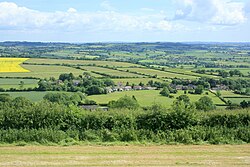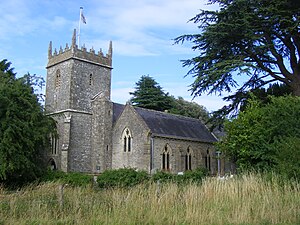Norton Malreward: Difference between revisions
Created page with "{{Infobox town |county=Somerset |picture=Norton Malreward.jpg|alt=The roofs of a row of houses amongst green fields |picture caption=Norton Malreward from Maes Knoll |lati..." |
No edit summary |
||
| Line 14: | Line 14: | ||
|os grid ref=ST600660 | |os grid ref=ST600660 | ||
}} | }} | ||
'''Norton Malreward''' is a small village and parish in [[Somerset]] four miles south of [[Bristol]] at the northern edge of the [[Chew Valley]]. In 1895 Norton Malreward was combined with | '''Norton Malreward''' is a small village and parish in [[Somerset]] four miles south of [[Bristol]] at the northern edge of the [[Chew Valley]]. In 1895 the civil parish of Norton Malreward was combined with that of neighbouring hamlet of '''Norton Hawkfield''' or Hautville into a single civil parish,<ref name="robionsonwj"/> which has a population of 246.<ref name="popn"/> Both ancient parishes form part of the [[hundred]] of [[Chew Hundred|Chew]].<ref name=genuki>{{cite web|title=Somerset Hundreds|url=http://www.genuki.org.uk/big/eng/SOM/Miscellaneous/|publisher=GENUKI|accessdate=8 October 2011}}</ref> | ||
== History == | == History == | ||
| Line 29: | Line 29: | ||
The Anglican parish church of Holy Trinity dates from the late 12th century. The tower which has since been altered was added in the 15th century and rebuilt around 1860 by James Wilson of [[Bath]]. It has been designated as a Grade II listed building.<ref>{{cite web|title=Church of Holy Trinity|url=http://www.imagesofengland.org.uk/Details/Default.aspx?id=32596|work=Images of England|publisher=[[English Heritage]]|accessdate=25 July 2010}}</ref> | The Anglican parish church of Holy Trinity dates from the late 12th century. The tower which has since been altered was added in the 15th century and rebuilt around 1860 by James Wilson of [[Bath]]. It has been designated as a Grade II listed building.<ref>{{cite web|title=Church of Holy Trinity|url=http://www.imagesofengland.org.uk/Details/Default.aspx?id=32596|work=Images of England|publisher=[[English Heritage]]|accessdate=25 July 2010}}</ref> | ||
== Grade II listed buildings == | == Grade -II listed buildings == | ||
* Manor Farmhouse<ref>{{Images of England|num=32597|desc=Manor Farmhouse}}</ref> | * Manor Farmhouse<ref>{{Images of England|num=32597|desc=Manor Farmhouse}}</ref> | ||
* Barn to south-east of Newbarn Farmhouse<ref>{{Images of England|num=32599|desc=Barn to south-east of Newbarn Farmhouse|fewer-links=yes}}</ref> | * Barn to south-east of Newbarn Farmhouse<ref>{{Images of England|num=32599|desc=Barn to south-east of Newbarn Farmhouse|fewer-links=yes}}</ref> | ||
Latest revision as of 11:37, 17 April 2018
| Norton Malreward | |
| Somerset | |
|---|---|
 Norton Malreward from Maes Knoll | |
| Location | |
| Grid reference: | ST600660 |
| Location: | 51°23’16"N, 2°34’23"W |
| Data | |
| Population: | 246 (2011[1]) |
| Post town: | Bristol |
| Postcode: | BS39 |
| Dialling code: | 01275 |
| Local Government | |
| Council: | Bath & NE Somerset |
| Parliamentary constituency: |
North East Somerset |
Norton Malreward is a small village and parish in Somerset four miles south of Bristol at the northern edge of the Chew Valley. In 1895 the civil parish of Norton Malreward was combined with that of neighbouring hamlet of Norton Hawkfield or Hautville into a single civil parish,[2] which has a population of 246.[1] Both ancient parishes form part of the hundred of Chew.[3]
History
Norton Malreward is listed as Nortone in the Domesday Book of 1086 meaning 'The north enclosure' from the Old English norp and tun. Malreward is a corruption of Malregard who was a tenant of the Bishop of Coutances in 1238.[4] During the reign of Edward I the manor was held by John Le Sore of Backwell. Later lords of the manor included Hawisia de Burton, John de Burton, Robert Grayndor, Robert Basset and Sir William Basset. In 1701 the manor was sold to Richard Holder and sold again in 1718 to Francis Freeman and Samuel Prigg.[2]
Just north of and overlooking the village is Maes Knoll Tump, a tumulus 390 feet by 84, and 45 feet in height, the start of the Wansdyke. The remains of this Iron Age hillfort lie at the eastern end of the Dundry Down ridge. The hillfort consists of a fairly large flat open area, roughly triangular in shape, that was fortified by ramparts and shaping of the steep-sided hilltop around the northern, eastern and south=western sides of the hill (the flat area in World War II was dotted with stone cairns to deter the landing of enemy gliders to invade Bristol; a detachment of the Dundry Home Guard had a draughty corrugated-iron look-out shed on the top of the tumulus).[5] Maes Knoll provides a splendid view over the lands it would have once commanded. From here, there are clear views north to Bristol, east to Bath and the Cotswold Hills, and south over Stanton Drew stone circles to Chew Valley Lake and the Mendip Hills.
Ammonites and fossil nautili are abundant in this neighbourhood.
The village lies on the route of the Monarch's Way long-distance footpath.
Religious sites

The Anglican parish church of Holy Trinity dates from the late 12th century. The tower which has since been altered was added in the 15th century and rebuilt around 1860 by James Wilson of Bath. It has been designated as a Grade II listed building.[6]
Grade -II listed buildings
- Manor Farmhouse[7]
- Barn to south-east of Newbarn Farmhouse[8]
- Newbarn Farmhouse[9]
- Norton Malreward Court[10]
- Stables and Coach-house to north of Norton Malreward Court[11]
- Whitewood Farmhouse[12]
- Model Farm and Farmhouse[13]
- Park Farmhouse[14]
References
- ↑ 1.0 1.1 "Norton Malreward Parish". Neighbourhood Statistics. Office for National Statistics. http://neighbourhood.statistics.gov.uk/dissemination/LeadTableView.do?a=7&b=11127143&c=Norton+Malreward&d=16&e=61&g=6387707&i=1001x1003x1032x1004&m=0&r=1&s=1388524327464&enc=1&dsFamilyId=2491. Retrieved 31 December 2013.
- ↑ 2.0 2.1 Robinson, W.J. (1915). West Country Churches. Bristol: Bristol Times and Mirror Ltd. pp. 72–76.
- ↑ "Somerset Hundreds". GENUKI. http://www.genuki.org.uk/big/eng/SOM/Miscellaneous/. Retrieved 8 October 2011.
- ↑ Robinson, Stephen (1992). Somerset Place Names. Wimborne, Dorset: The Dovecote Press Ltd. ISBN 1-874336-03-2.
- ↑ Bristol Record Office accession 44394
- ↑ "Church of Holy Trinity". Images of England. English Heritage. http://www.imagesofengland.org.uk/Details/Default.aspx?id=32596. Retrieved 25 July 2010.
- ↑ Historic England. "Manor Farmhouse (32597)". Images of England. http://www.imagesofengland.org.uk/Details/Default.aspx?id=32597
- ↑ Historic England. "Barn to south-east of Newbarn Farmhouse (32599)". Images of England. http://www.imagesofengland.org.uk/Details/Default.aspx?id=32599
- ↑ Historic England. "Newbarn Farmhouse (32598)". Images of England. http://www.imagesofengland.org.uk/Details/Default.aspx?id=32598
- ↑ Historic England. "Norton Malreward Court (32602)". Images of England. http://www.imagesofengland.org.uk/Details/Default.aspx?id=32602
- ↑ Historic England. "Stables and Coach-house to north of Norton Malreward Court (32603)". Images of England. http://www.imagesofengland.org.uk/Details/Default.aspx?id=32603
- ↑ Historic England. "Whitewood Farmhouse (32604)". Images of England. http://www.imagesofengland.org.uk/Details/Default.aspx?id=32604
- ↑ Historic England. "Model Farm and Farmhouse (32600)". Images of England. http://www.imagesofengland.org.uk/Details/Default.aspx?id=32600
- ↑ Historic England. "Park Farmhouse (32601)". Images of England. http://www.imagesofengland.org.uk/Details/Default.aspx?id=32601
Outside links
| ("Wikimedia Commons" has material about Norton Malreward) |
